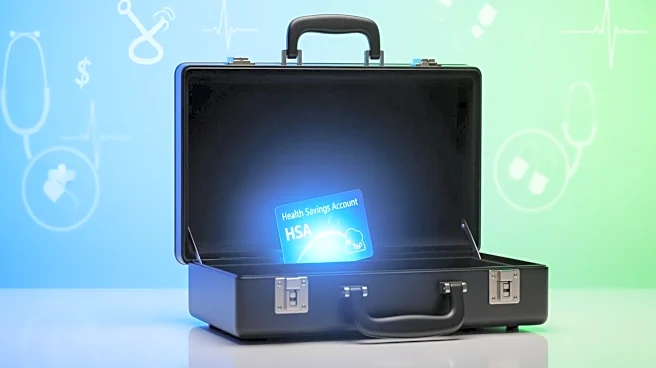What's Happening?
Self-employed individuals, including small-business owners and independent contractors, have the option to open a Health Savings Account (HSA) to manage healthcare expenses. An HSA is a tax-advantaged
account that allows individuals to pay for qualified medical expenses with tax-free dollars. To be eligible, one must have a qualified high-deductible health plan (HDHP). The IRS outlines several requirements for opening an HSA, such as having no other health coverage except certain disregarded coverage like dental and vision insurance. The contribution limits for 2025 are set at $4,300 for individual plans and $8,550 for family plans, with an additional $1,000 catch-up contribution for those aged 55 or older. The One Big Beautiful Bill Act will expand eligibility rules starting January 1, 2026, allowing more self-employed individuals to benefit from HSAs.
Why It's Important?
HSAs offer significant financial benefits for self-employed individuals by reducing taxable income and providing a means to save for healthcare expenses. This is particularly beneficial for those without employer-sponsored health plans. The ability to invest HSA funds can lead to growth over time, providing a financial cushion for future medical expenses. The expansion of eligibility rules under the One Big Beautiful Bill Act will make HSAs accessible to a broader range of self-employed individuals, potentially reducing healthcare costs and improving financial stability for this group.
What's Next?
With the upcoming changes in eligibility rules, self-employed individuals should review their current health plans to determine if they qualify for an HSA. Those interested in opening an HSA should research custodians or administrators to find the best fit for their needs, considering factors like fees and investment options. As the tax-filing deadline approaches, individuals should plan their contributions to maximize tax benefits and ensure compliance with IRS regulations.
Beyond the Headlines
The introduction of HSAs for self-employed individuals highlights the ongoing shift towards more personalized healthcare management. This development may encourage more individuals to pursue self-employment, knowing they have viable options for managing healthcare costs. Additionally, the ability to invest HSA funds introduces a new dimension to personal finance, allowing individuals to grow their savings while planning for healthcare needs.









